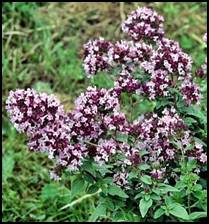
Oregano
SCIENTIFIC NAME:(Origanum vulgare)
Oregano is a perennial growing to 20 inches, with pink flowers and spade-shaped, olive-green leaves. It prefers a hot, relatively dry climate, but will do well in other environments. To cultivate, it should be planted in early spring, in fairly dry soil, with full sun. The plants should be spaced 12 inches apart. A closely related plant is marjoram from Turkey, which, however, differs significantly in taste, because phenolic compounds are missing from its essential oil. Some varieties show a flavor intermediate between oregano and marjoram. Oregano is an important culinary herb, used for the flavor of its leaves, which can be more flavorful when dried than fresh. It has an aromatic, warm and slightly bitter taste, which can vary in intensity. Oregano is high in antioxidant activity, due to a high content of phenolic acids and flavonoids.
Common Names:
European Oregano, Mediterranean Oregano, Mountain Mint, Oil of Oregano, Oregano Oil, Wild Marjoram, Winter Marjoram, Wintersweet.

Uses:
Oregano is a powerful antibiotic and has been proven to be more effective in neutralizing germs than some chemical antibiotics. It has been effective against germs like Staphylococcus aureas, Escherichia coli, Yersinia enterocolitica and Pseudomonas aeruginosa. Skin infections, upset stomachs, sinus congestion, and to treat colds and sore throats at their onset. Cholesterol lowering properties.Oil of Oregano can be applied directly onto the skin to treat itches, skin infections, and irritated gums, but only if it has been diluted. Always follow the instructions on your particular bottle before applying topically onto the skin, since highly concentrated oils may first need to be mixed with Olive Oil or Coconut Oil before application (usually one teaspoon of Olive Oil or Coconut Oil per one drop of Oil of Oregano).
Applications:
Oil:
Mix 1 drop of Oregano oil with 1 to 2 teaspoons of Olive Oil or Coconut Oil for skin and gum irritations. 2 to 3 drops in an 8 oz. glass of milk or juice for mild indigestion, sinus congestion, colds and sore throats.
Tea:
2 to 3 cups of tea brewed from steeping fresh or dried leaves.
Warnings:
While Oil of Oregano has many benefits, there are a few possible side effects:
• It may reduce the body’s ability to absorb iron. Therefore, it is recommended that any regular use be combined with regular consumption of iron supplements. For this reason, women are advised not to take this oil during their pregnancy.
• Pregnant women should also avoid this oil since it can stimulate blood flow in the uterus, which can weaken the lining that surrounds the fetus in the womb.
• People that have allergies to thyme, basil, mint, or sage may be sensitive to Oil of Oregano as well, since they are in the same family of plants. If any skin irritation, rashes, or vomiting occurs when using it, it is recommended that you discontinue use and consult your doctor.






